
CPCS TRANSCOM MEDIACORP CO-PUBLISHED BY 4 FLEET-OF-FOOT RECRUITING: Employers compete across sectors 6 LIST OF WINNERS: National Capital Region’s Top Employers (2023) 14 TIGHT LABOUR MARKET: Nurturing success wins the race
Transcom, one
this year’s
p Employees at CPCS
of
winners.
Discover the search engine that brings you thousands of direct-employer jobs every day – plus exclusive employer reviews from the editors of the National Capital Region’s Top Employers. Each year, millions of Canadians use Eluta.ca to find hundreds of thousands of new job postings in their field.

Visit us today on your laptop or smartphone.
Now search for hybrid workplace jobs on Eluta!
FIVE-STAR JOB SEARCH
† For the 12 months ended August 31, 2022, Eluta.ca received 2,009,405 unique visitors (desktop and mobile), who performed 12,445,027 searches. Source: Google Analytics.
†
NATIONAL CAPITAL REGION’S TOP EMPLOYERS

2023 MAGAZINE
Anthony Meehan, PUBLISHER
Editorial Team:
Richard Yerema, EXECUTIVE EDITOR
Kristina Leung, MANAGING EDITOR
Stephanie Leung, EDITOR
Chantel Watkins, ASSISTANT EDITOR
Juliane Fung, RESEARCH EDITOR
Sonja Verpoort, RESEARCH ASSISTANT
Jing Wang, RESEARCH ASSISTANT
Advertising Team:
Ye Jin Suhe, MANAGER, PUBLISHING
Chariemagne Kuizon, JUNIOR COORDINATOR
Vishnusha Kirupananthan, BRANDING & GRAPHIC DESIGNER
Sabrina Wu, SENIOR CONTENT & PUBLISHING SPECIALIST
Berton Woodward, SENIOR EDITOR
Deb Bourk
Abigail Cukier
Mary Dickie
Jane Doucet
Peter Hendra
The mid-winter season is always a time for reflection, but particularly in the National Capital Region. The Winterlude festival is now in full swing, but in a couple of weeks the celebrations and crowds around the Rideau Canal will give way to a quieter time as residents and organizations turn their thoughts to the year ahead.
From our modest editorial perch, February is the month when we announce each year’s winners of the National Capital Region’s Top Employers competition, now in its 18th season. The list’s announcement offers a pause to reflect on the employment market in the nation’s capital and to consider where it is headed.
can be as productive working from home. And this is where the region’s private-sector employers are gaining a steady but noticeable edge over their public sector competitors, who remain cautious about the optics of having staff in-office less than full time.
In this year’s announcement magazine, you’ll find the stories of how public-sector employers are borrowing these best-practices from the private sector, and vice versa. Today, our editors also released detailed ‘reasons for selection’ explaining why each winner was chosen, which are available through the competition homepage: www.canadastop100.com/ottawa
D’Arcy Jenish
Bruce McDougall
Rick McGinnis
Diane Sims
Like the metropolitan area it represents, the National Capital Region’s Top Employers competition has changed significantly over the years. Previously, we’ve written about the tension between the region’s public- and private-sector employers: it’s a familiar refrain, with public-sector employers offering first-class programs like pensions, maternity leave and comprehensive health benefits that some private-sector employers find hard to match.
With the arrival of the pandemic, however, things have changed: it’s true that Canadians now value stable employers more than ever, but it’s equally true that job-seekers’ expectations have changed and that flexibility is now prized above almost any other workplace benefit. After working from home during the pandemic, few Canadians yearn to return to the office full-time if they
Adding fuel to the fire is an exceptionally tight labour market, which will persist for longer than most people recognize. Faced with an unemployment rate of only 4.6%, employers in the National Capital Region are focused on finding any innovation that keeps them ahead in attracting and retaining talented employees.
Our annual list of the National Capital Region’s Top Employers has always aimed to be a ‘catalogue of best practices’ when it comes to chronicling progressive HR policies and forward-thinking workplaces. If you think your organization meets this description and would like to be considered for next year’s competition, I encourage you to contact our editorial team at ct100@mediacorp.ca
–Tony Meehan
3 NATIONAL CAPITAL REGION’S TOP EMPLOYERS 202 3
©
p Staff at the Library of Parliament sorting books on the main floor of the library, which is also a National Historic Site. NATIONAL
LIBRARY OF
PARLIAMENT
2023 Mediacorp Canada Inc. and Postmedia. All rights reserved.
CAPITAL REGION’S TOP EMPLOYERS is a registered trade mark of Mediacorp Canada Inc. Editorial inquiries: ct100@mediacorp.ca
Sponsored Profile Writers:
Leading NCR public and private-sector employers learn from each other’s recruitment strategies
More than ever, the National Capital Region (NCR) continues to nurture and attract a vast array of talent in various fields, from construction to high-tech — and everything in between.
Better still, the leading public- and private-sector employers are studying each other’s best practices to put their best foot forward in recruitment. While public

sector employers are perceived to offer more in-depth health, family and pension benefits, private sector employers are responding by offering faster career development and advancement, as well as less bureaucratic management structures that help highly motivated employees to succeed.
But looking at some of the winners of this year’s Top Employers competition reveals how the private sector is getting its
fair share of recruits.
Richard Yerema, executive editor at the competition, says, “The private sector by necessity has to be especially robust because younger people are looking for more security plus better vacations, pensions and perks. Fortunately, the NCR’s private sector top employers distinguish themselves by being very creative and fleet-of-foot.”
As the NCR’s largest private employer,
with a staff of 1,800 people, Tomlinson Group is a leader in environmental and transportation infrastructure services. Still, “We routinely compete with the government for new employees,” shares Dana Lewis, manager, human resources. Instead of trying to keep up with the public service’s traditional focus on pensions and similar benefits, the company “Focuses on finding people who align with our company and its values,”
4 NATIONAL CAPITAL REGION’S TOP EMPLOYERS 202 3
‘Top employers distinguish themselves by being very creative and fleet-of-foot.’
p Nepean-based Ross Video emphasizes career growth for employees, with daily meetings to discuss what team members are working on and the challenges involved.
ROSS VIDEO
says Lewis. “That is key to our success. From there, we nurture them.”
Tomlinson Group does so with ramped-up, old-fashioned but effective strategies. “For example, we invest extremely heavily in our training and development programs, conduct regular one on ones and undertake performance reviews to the degree you don’t see in other companies of our type,” says Lewis. “Applicants tell us this is a big lure.”
Tomlinson Group also provides something almost exclusive to the private sector. “If you have the desire, you can move up the corporate ladder far quicker than in many government organizations,” Lewis reveals.
With headquarters and manufacturing operations in Iroquois, Ontario, and R&D in Ottawa, Ross Video powers live video productions for billions of global viewers daily. “We are constantly recruiting computer science students and those from the engineering disciplines, as does government, so the competition is indeed vigorous,” says Cathy McCallion, recruitment manager.

Like Tomlinson Group, Ross Video emphasizes career growth as a way to gain an edge. “Daily, we have meetings in which each team member will discuss what they’re working on and the challenges involved, and we encourage the new recruits to participate,” McCallion says. “This builds confidence and expedites the experience they require to operate at the top of their game.”
Transparency is another significant element that has enabled Ross Video to attract and retain new blood. “For example, in our quarterly staff updates, employees get a clear idea of what’s happening in each of our departments, right down to finances,” shares McCallion.

Capping all of this is the company’s commitment to flexibility. “This includes remote work, maternity, paternity and compassionate leave, personal time off and many other elements,” says McCallion. “It’s part of our overall people-first philosophy, and we must be doing something right because it has resulted in us achieving 31 consecutive years of growth.” It’s a great example of borrowing some of the best benefits traditionally offered by public sector employers — and bringing them into the private sector.
– Robin Brunet
5 NATIONAL CAPITAL REGION’S TOP EMPLOYERS 202 3
p The Canadian Food Inspection Agency provides staff with a wide range of training, including subsidies for professional accreditations, orientation programs, online training, in-house training, mentoring and in-house career planning.
p Officers in the Parliamentary Protective Service keep watch over Parliament of Canada sites around the clock.
CFIA FLEET-OF-FOOT (Continued)
A. VAN BEEK/PPS
202 3 WINNERS
p Dairy Farmers of Canada employees are encouraged to volunteer with up to three paid days annually. The following organizations have been chosen as National Capital Region’s Top Employers for 2023 (employee count refers to full-time staff):

ADOBE SYSTEMS CANADA INC., Ottawa. Software publishers; 342 employees. Manages a sabbatical program of up to six weeks for employees celebrating anniversary milestones in five-year increments.
ALGONQUIN COLLEGE OF APPLIED ARTS & TECHNOLOGY, Nepean. Post-secondary education; 1,421 employees. Provides subsidized access to on-campus fitness facilities, with personal trainers, an indoor running track, a bouldering and climbing wall, and registered massage therapist services.
ALTERNA SAVINGS AND CREDIT
UNION LIMITED, Ottawa. Credit unions; 584 employees. Enhanced its coverage for mental health care from $500 to $2,500 per year and expanded the group of practitioners covered.
ASSEMBLY OF FIRST NATIONS, Ottawa. Indigenous government; 147 employees. Provides generous maternity and parental leave top-up for new mothers, to 93 per cent of salary for up to 50 weeks.
BANK OF CANADA, Ottawa. Central bank; 2,035 employees. Offers the option to purchase up to five additional vacation days as part of its flexible benefits plan.
CANADA POST CORPORATION, Ottawa. Postal service; 49,624 employees. Launched its mental health strategy in the past year and maintains wellness and safety
programs to fosters a psychologically healthy and safe workplace.
CANADA REVENUE AGENCY / CRA, Ottawa. Federal government, general economic programs; 55,588 employees. Offers family-related leave with pay for up to 45 hours per year, which can be used to care for a sick family member, to accompany family members to appointments, or to provide temporary child care.
CANADIAN FOOD INSPECTION AGENCY, Ottawa. Federal government, food inspection and regulation; 6,838 employees. Facilitated discussions with BIPOC employees to better understand their experiences with systemic racism and discrimination.
CANADIAN INTERNET REGISTRATION AUTHORITY / CIRA, Ottawa. Information technology services;
110 employees. Celebrates exceptional performance through a number of aptly themed awards, such as the Canada Goose Award for an employee who leads the gaggle.
CARLETON UNIVERSITY, Ottawa. Post-secondary education; 2,516 employees. Provides unlimited coverage for psychologist services, massage and physiotherapy as part of its benefits plan.
CBC / RADIO-CANADA, Ottawa. Broadcasting; 8,209 employees. Maintains a special assistance fund to help employees and their eligible dependents claim necessary medical expenses not covered by other sources, to a lifetime maximum of $12,500.
C HILDREN’S AID SOCIETY OF OTTAWA / CASO, Gloucester. Children and youth support services; 402
6 NATIONAL CAPITAL REGION’S TOP EMPLOYERS 202 3
DAIRY FARMERS OF CANADA
2023 WINNERS
Continued employees. Supports lifelong learning with tuition subsidies for courses taken externally, to $2,500 per year.
CHILDREN’S HOSPITAL OF EASTERN ONTARIO / CHEO, Ottawa. Hospitals; 2,325 employees. Manages the Shining Star peer recognition program and honours award recipients at an annual evening gala.
COLLEGES AND INSTITUTES
CANADA / CICAN, Ottawa. Professional organizations; 134 employees. Introduced a hybrid work policy in 2022 to provide more flexibility to work at home and in-office, in whatever combination employees choose.
COMMUNICATIONS SECURITY ESTABLISHMENT / CSE, Ottawa. Federal government, national security; 3,236 employees. Manages a unique Legacy Talks series where soon-to-be retired employees share their corporate, operational and personal knowledge, gained after long and productive careers.

CO-OPERATIVE HOUSING FEDERATION OF CANADA, Ottawa. Co-operative housing; 30 employees. Moves employees to four weeks of annual vacation allowance after only four years on the job.
CPCS TRANSCOM LIMITED, Ottawa. Transportation consulting services; 79 employees. Cultivates an ownership culture through share purchase and profit-sharing plans, available to all employees.

DAIRY FARMERS OF CANADA / LES PRODUCTEURS LAITIERS DU CANADA, Ottawa. Business associations; 76 employees. Encourages employee volunteerism with paid time off to volunteer, up to three days annually.
DEPARTMENT OF FINANCE CANADA, Ottawa. Federal government, general economic programs; 796 employees. Organizes FIN Ideas Hub, informal sessions that bring employees together from various branches to broaden thinking on prominent policy questions, encourage collaboration and share ideas.
DEPARTMENT OF JUSTICE CANADA, Ottawa. Federal government, legal system administration; 4,896 employees. Fosters connection through regular social events and activities, including weekly coffee breaks, with work excluded from conversations, and virtual “5 à 7” events.
7 NATIONAL CAPITAL REGION’S TOP EMPLOYERS 202 3
p A Canada Post employee tests deliveries in an e-cargo cart, part of the organization’s efforts to embrace a low-carbon future.
p A cameraman on location for CBC / Radio Canada in the Ottawa-Gatineau region.
CANADA POST CBC/ RADIO CANADA
2023 WINNERS Continued
EGG FARMERS OF CANADA, Ottawa. Business associations; 60 employees. Manages the annual Get Cracking Award to honour employees for their volunteerism, also making a donation to a charity of the recipient’s choice.
EMPLOYMENT AND SOCIAL DEVELOPMENT CANADA, Gatineau. Federal government, social development, employment insurance, passport services; 37,334 employees. Helps employees plan for the future with pre-retirement workshops on topics including financial planning, health and nutrition, and psychological aspects of retirement.
ENGINEERS CANADA, Ottawa. Professional organizations; 50 employees. Encourages staff to engage in healthy habits at home and at work through a variety of initiatives, including step challenges and healthy eating lunch and learns.

EVOLUGEN, Gatineau. Renewable energy generation and services; 238 employees. Maintains a charitable focus on initiatives related to health and safety, environmental initiatives, education and research, community services, and Indigenous communities.
EXPORT DEVELOPMENT CANADA, Ottawa. International trade financing and support services; 2,019 employees. Employees may allocate their flexible benefits credits to RRSP, TFSA or RESP accounts, or distribute credits as a donation to the United Way.

FISHERIES AND OCEANS CANADA AND THE CANADIAN COAST GUARD, Ottawa. Federal government, administration of conservation programs; 13,705 employees. Extends health benefits to retirees, with no age limit and up to 69 per cent of premium coverage.
HEALTH CANADA / SANTÉ CANADA, Ottawa. Federal government, administration of public health programs; 9,987 employees. Maintains a longstanding mental health and wellness strategy to build a healthy, respectful and inclusive workplace and offers coverage for mental health services, to $2,000 per year.
HEALTH STANDARDS ORGANIZATION / HSO, Gloucester. Professional organizations; 219 employees. Encourages employees to take the time they need to rest and recharge with up to 15 paid sick days annually.
8 NATIONAL CAPITAL REGION’S TOP EMPLOYERS 202 3
p Over the past year, Canadian Food Inspection Agency facilitated discussions with BIPOC employees to better understand their experiences with systemic racism and discrimination.
p Emergency responders at the City of Ottawa.
AGENCY CITY OF OTTAWA
CANADIAN FOOD INSPECTION
PHOTOS (CLOCKWISE FROM TOP):
1. An EDC employee takes part in a hybrid meeting.

2. Sonja Shorey, vice-president of marketing strategy at Invest Ottawa, speaks at an International Women's Day event.

3. Hydro Ottawa encourages employees to get involved with paid time to volunteer and matching charitable donations.

9 NATIONAL CAPITAL REGION’S TOP EMPLOYERS 202 3
INVEST OTTAWA EDC
HYDRO CANADA
PHOTOS (FROM TOP TO BOTTOM):
1. Kanata-based software developer Kinaxis offers employees the last Friday of every month off to take a shared mental break, continuing a pandemic-era policy.

2. The Library of Parliament in starts new employees with four weeks of paid vacation and considers previous experience when setting vacation for experienced hires.
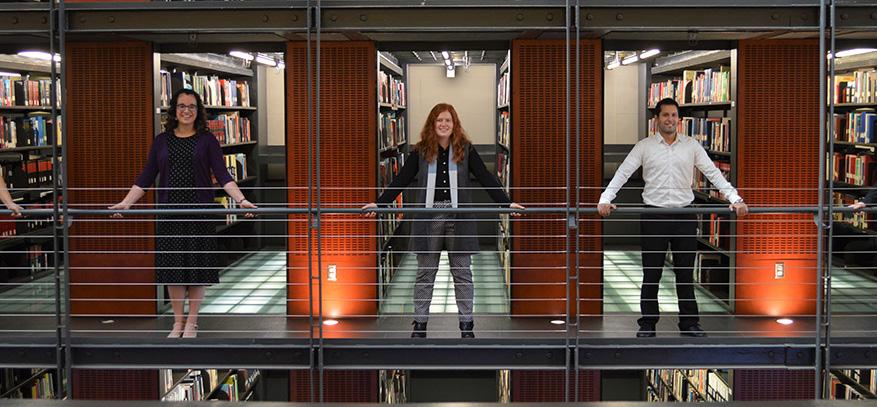
10 NATIONAL CAPITAL REGION’S TOP EMPLOYERS 202 3
KINAXIS LIBRARY OF PARLIAMENT
2023 WINNERS Continued
HYDRO OTTAWA, Gloucester. Electric power distribution; 687 employees. Supports employees who want to start a family with subsidies for fertility treatments and fertility drugs if needed, to a lifetime maximum of $15,000.
IMMIGRATION, REFUGEES AND CITIZENSHIP CANADA / IRCC, Ottawa. Federal government, immigration services; 10,347 employees. Hosted a virtual mental health and wellness fair featuring a TED Talk Series, yoga, guest speakers and presentations.
INNOVATION, SCIENCE AND ECONOMIC DEVELOPMENT CANADA, Ottawa. Federal government, industry and economic development programs; 6,160 employees. Provides long-term peace of mind with contributions to a defined benefit pension plan and retirement planning assistance.
INVEST OTTAWA, Ottawa. Administration of general economic programs; 102 employees. Helps employees balance work and their personal lives with flexible work hours, eight days of “life leave” and has introduced hybrid work options.
KINAXIS INC., Kanata. Software developers; 670 employees. Has continued the pandemic-era policy of offering employees the last Friday of every month off, providing a shared mental break along with an additional long weekend.
LA CITÉ, Ottawa. Post-secondary education; 541 employees. Introduced a formal hybrid work program to supplement its existing flex work options and adapted onsite physical workspaces to accommodate a return to work.
LIBRARY OF PARLIAMENT, Ottawa. Federal government, library; 413 employees. Starts new employees with four weeks of paid vacation and considers previous work when setting vacation entitlements for more experienced new candidates.
LUMENTUM OTTAWA INC., Nepean. Specialty manufacturing; 345 employees. Lets new parents extend their leave into an unpaid leave of absence as well as offering phased-in work options when they are ready to return to work.
NATIONAL CAPITAL COMMISSION, Ottawa. Federal government, land and building management; 523 employees. Introduced new hybrid work
arrangements to accompany existing flex options, offering ergonomic assessments for employees’ home offices.
NELLIGAN O’BRIEN PAYNE LLP, Ottawa. Law firms; 110 employees. Encourages its employees to take the time to support local charitable initiatives with one paid day off to volunteer.

OFFICE
OF
THE SUPERINTENDENT OF FINANCIAL INSTITUTIONS OF CANADA, Ottawa. Federal government, regulation of financial institutions; 948 employees. Supports ongoing employee development with tuition subsidies for courses related and not directly related to their current position.
OTTAWA, CITY OF, Ottawa. Municipal governments; 12,899 employees. Helps employees plan for a secure future with retirement planning assistance services and contributions to a defined benefit pension plan.
OTTAWA COMMUNITY HOUSING CORPORATION, Ottawa. Administration of housing programs; 409 employees. Supports its new moms, dads and adoptive parents with maternity and parental leave top-up payments, up to 95 per cent of salary for 25 weeks.
PARLIAMENTARY PROTECTIVE SERVICE, Ottawa. Police service; Starts its new employees with four weeks of paid vacation and considers previous work when setting vacation entitlements for experienced candidates.
PERLEY-ROBERTSON, HILL & MCDOUGALL LLP / S.R.L., Ottawa. Law firms; 110 employees. Encourages employee wellness through seminars on a range of relevant topics, from nutrition to sleep therapy to mindful meditation and yoga.
PUBLIC SERVICES AND PROCUREMENT CANADA, Gatineau. Federal government, procurement services; 17,710 employees. Along with in-house training programs and tuition subsidies, employees can apply for an educational leave of absence, ranging up to 16 weeks in duration.
PYTHIAN SERVICES INC., Ottawa. Computer systems design and support services; 123 employees. Encourages ongoing employee development through generous tuition subsidies for courses and related and not directly related to their current position, to $5,000 annually.
11 NATIONAL CAPITAL REGION’S TOP EMPLOYERS 202 3
p Pythian Services Inc. employees celebrating Holi, the festival of colours.
INC.
PYTHIAN SERVICES


12 NATIONAL CAPITAL REGION’S TOP EMPLOYERS 202 3
PHOTOS (FROM TOP TO BOTTOM):
1. Staff from Perley-Robertson, Hill & McDougall LLP / s.r.l. at an Ottawa Redblacks game.
PERLEY-ROBERTSON CIRA
2. Canadian Internet Registration Authority celebrates exceptional employee performance with themed awards, including the Canada Goose award for an employee ‘who leads the gaggle’.
LIKTECH CORPORATION, Kanata. Computer software; 186 employees. Offers an unlimited vacation policy for all of its employees.
ROSS VIDEO LTD., Nepean. Audio and video communications technology; 825 employees. Lets employees design a suitable work schedule with their managers and select from one of four work style options.
ROYAL CANADIAN MINT, THE, Ottawa. Minting and coin distribution; 1,188 employees. Offers generous coverage for mental health practitioner services through its health benefits plan, up to $2,000 annually.
GROUP, Ottawa. Specialty hospitals; 937 employees. Supports its new moms, dads and adoptive parents with maternity and parental leave top-up payments, along with the option to extend their leave into an unpaid leave of absence.
SHOPIFY INC., Ottawa. Multichannel commerce platform; 7,538 employees. Manages the unique Hack Days program that offers three full days annually for employees to “step out of their day jobs and tackle a new problem”.
STATISTICS CANADA / STATISTIQUE
CANADA, Ottawa. Federal government, statistical agency; 6,506 employees. Established a workplace wellness committee that is managed by employee volunteers who manage programs and initiatives in support of their colleagues.
TEHAMA INC., Ottawa. Computer software; 65 employees. Offers all employees a flexible paid vacation program that features a 30-day flexible “bucket of time” that is available for employees to use as they need during the year.
TOMLINSON GROUP, Nepean. Construction services; 1,408 employees. Encourages employees to become recruiters for the firm with generous new employee referral bonuses, from $500 to $1,000 depending on the position.
UNIVERSITIES CANADA / UNIVERSITÉS CANADA, Ottawa. Professional organizations; 84 employees. Introduced a formal hybrid work program that includes generous home office allowances and new flex work stations that
employees can book online when coming to the office.
UNIVERSITY OF OTTAWA, Ottawa. Post-secondary education; 5,210 employees. Offers a generous mental health practitioner benefit as part of their health benefits plan, to $3,000 annually.
– Richard Yerema & Kristina Leung
p In the spirit of its ‘Digital by Default’ work style, Shopify recently introduced the Destination90 program to allow employees to work outside of the country for three months of the year.

13 NATIONAL CAPITAL REGION’S TOP EMPLOYERS 202 3
ROYAL OTTAWA HEALTH CARE
Continued
2023 WINNERS
SHOPIFY
Time-proven strategies help Ottawa private and public sectors tackle tight labour market
Pandemic-inspired changes to recruitment have proven successful
Despite rising interest rates and rumblings of recession, the National Capital Region (NCR) economy is robust, with the federal government’s deficit lower than projected (at $90.2 billion) and the Ottawa-Gatineau metropolitan area adding nearly 50,000 jobs in the first half of 2022.
But accompanying the rebound are familiar recruitment challenges, and this year’s winners of the NCR’s Top Employers competition provide insight into how these challenges are being met. The NCR competition is organized by the editors of the national Canada’s Top 100 Employers project, who annually single out the employers in the NCR that lead the way in recruitment and retention.
Like the national competition, the editors of NCR’s Top Employers annually release their picks for the best employers. The winners are chosen based on the same criteria as the national competition, including compensation and benefits, work and social atmosphere, the quality of the workplace, training and upward mobility.
Kristina Leung, managing editor at Canada’s Top 100 Employers, points out that the post-pandemic jobs market is

characterized by “revolutionary speeds of change” and that unprecedented demand, the ongoing labour shortages, and other factors “mean that much more skill is required in managing the workforce.”
A strong foundation comes from familiar strategies
The NCR has traditionally been a friendly recruitment tug-of-war between the public and private sectors, with the former perceived by some as having the resources to offer far more valuable benefits packages to potential hires. However, time-proven strategies such as transparent performance management enable companies such as CPCS Transcom Limited (a management consulting firm specializing in infrastructure) to maintain a healthy rate of 40 to 50 new hires annually.
“We’re extremely performance focused, which influences our compensation packages,” says CPCS human resources manager Diane Lane-Hutchings. “And we’re transparent in all our decisions, which helps our employees take pride in their work.”
On the public side, organizations like the Department of Fisheries and Oceans and the Canadian Coast Guard (DFOCCG) must reimagine traditional packages to include modern perks. DFO-CCG director general of human resources, Jennifer Cruickshank notes that recruitment “is an important challenge as the private sector aims to offer all the benefits of the public sector.”
Step one for the DFO-CCG is finding the right people for the right roles. “We tend to recruit employees who find passion in our mandate,” Cruickshank says.
14 NATIONAL CAPITAL REGION’S TOP EMPLOYERS 202 3
p A CPCS Transcom employee rings the bell at the company’s Ottawa head office, alerting colleagues that a new contract has been won.
“A wide variety of strategies are necessary to attract and retain the best talent.”
— Kristina Leung Managing Editor
CPCS
Inclusion is another strategy. “Fisheries and Oceans Canada and the Canadian Coast Guard has established a national network for diversity and inclusion, which works with other interest groups in the organization,” Cruickshank says. “These networks include Persons with Disabilities and a special network for young professionals who have joined the department (Your Professionals).”
Diving into new talent pools
The pandemic accelerated many changes in recruitment and retention.
Case in point: at Qlik, a software company, sourcing teams look for new talent primarily online. “We have found this to be far more efficient and certainly saves on travel expenses and logistics,” says Ruthann Wry, Qlik’s chief people officer.
In fact, over the past 18 months, 60 per cent of Qlik’s new hires in Canada were secured through direct sourcing online.
Concurrently, Qlik works hard to promote its brand online. “We promote our people, culture, and product to attract the appropriate new candidates,” Wry says. “This is crucial, because you can throw all sorts of money at newcomers, but if they find they don’t like your culture

they won’t stay for long.”
Qlik has also enjoyed considerable success filling open jobs both internally and through their employee referral program. The company tripled its employee referral bonus program when it was at the peak of a hiring period a year ago.
Be flexible
As the last few years have made abundantly clear, flexibility is important in making any workplace desirable. About remote working at Qlik, Wry points out that “We leave it to our regional managers to decide what ratio of remote and in office works best for their teams.”
Leung says that while flexibility is a must for any type of employer, it should be part of a greater package of benefits: “Companies realize that a wide variety of strategies are necessary to attract and retain the best talent.”
As the work world continues to recover, the ingredients that have always enabled employers to stand out from the crowd are more important than ever. Good wages are one thing, but initiatives that make jobs meaningful and workplaces desirable are what really drives recruitment – and inspires loyalty.
– Robin Brunet
q Employment and Social Development Canada offers excellent maternity and parental leave top-up, as well as subsidized onsite child care at its Gatineau head office.
15 NATIONAL CAPITAL REGION’S TOP EMPLOYERS 202 3
TIGHT LABOUR MARKET (Cont.) ESDC
Algonquin College offers a culture of inclusion and growth
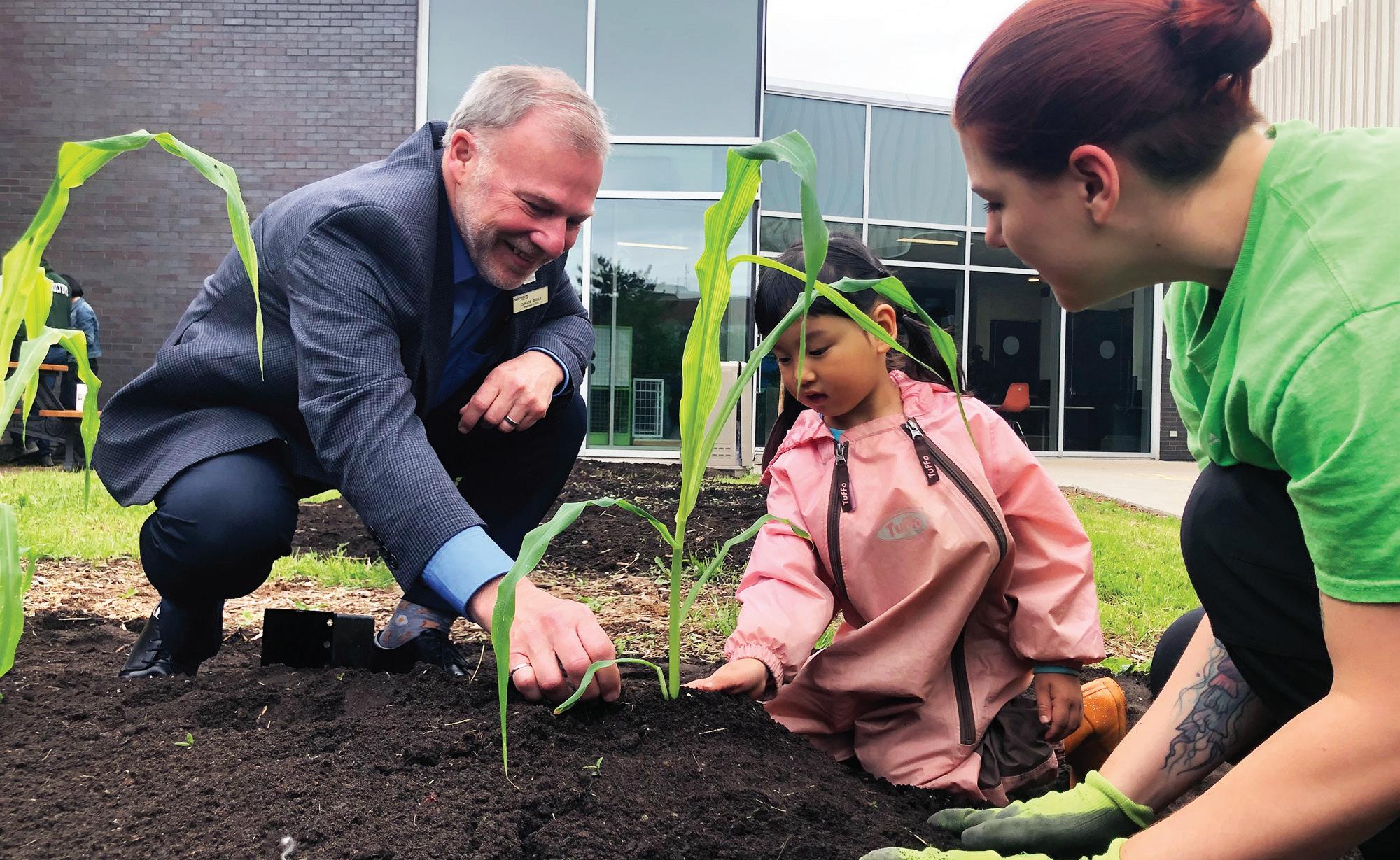
“As large as it is, Algonquin College is a very tight-knit community,” says Zainab Nasser, professor in the School of Business and former co-operative education consultant. “Through the Co-Op Department, I met so many chairs and coordinators from different schools across the college, and that’s how I ultimately ended up in my teaching role.”
Established in 1967, Algonquin College was named in honour of the Anishinaabe Algonquin Nation, as the college is located on the unceded, unsurrendered territory of the Algonquin peoples. There are four campuses in Ontario –Ottawa, Pembroke, Perth and AC Online, plus, a Corporate Training Centre. The college offers more than 200 programs in a multitude of areas.
“It all begins with our mission to transform hopes and dreams into lifelong success – which is applicable to both our learners and employees,” says president and CEO Claude Brulé.
While Nasser’s background is
in finance, she gained valuable experience in education working as a teaching assistant while completing her MBA. Inspired by her dream of working in education, she applied to Algonquin College after maternity leave, where she was offered a part-time position in the Co-Operative Education Department. Nasser soon found other growth opportunities at the college as well.
“We provide networking and information sessions to our employees, but I think one of our biggest achievements was planning the International Women’s Day breakfast with an inspirational speaker,” says Nasser, who became a member of the Leadership Development for Women Working
Group committee soon after joining the college.
Nasser’s Algonquin College experience led her to take on independent consulting in education and project management, while continuing to teach part-time in the School of Business. “It’s so important for me to continue to have this connection to the college community,” she says.
Algonquin College’s inclusive culture begins at orientation when Brulé and his senior team meet with new employees. They then meet again in three months to discuss the onboarding experience and what, if anything, could be improved. Some worthwhile ideas have been implemented from this exchange, such as developing
a glossary of commonly used corporate acronyms as well as pairing up employees as a “buddy system.”
A commitment to Indigenous knowledge and traditions is another integral part of the institution’s culture and operations. The recently launched Pathways Project identified interior and exterior “pathways” on the Ottawa campus and renamed them with Indigenous names. The college is also currently updating its Inclusion and Diversity Blueprint through a community consultation and engagement process.
Algonquin College offers internal courses for employees from several flagship programs, including the Algonquin Leadership in
16 NATIONAL CAPITAL REGION’S TOP EMPLOYERS 202 3
Claude Brulé, president and CEO, planting in the ‘Three Sisters Garden’ at Algonquin College, which represents the three main agricultural crops of Indigenous Peoples.
“It all begins with our mission to transform hopes and dreams into lifelong success – which is applicable to both our learners and employees.”
— Claude Brulé President and CEO
Education Institute, Leadership Mentoring Program, Management Academy, Performance Institute and Support Staff Academy. There is also a discount on Algonquin College courses and programs, and full-time employees who need to externally upgrade their credentials can apply for a possible tuition

reimbursement or a sabbatical. Along with these professional development programs, Brulé says, he is excited about the opportunities available to employees. In an organization of Algonquin’s size, there are working groups, task forces and committees that provide opportunities for engagement and

development, such as the Inclusion and Diversity Circle.
“I am personally a product of that. I’ve had many opportunities during my time at Algonquin College,” says Brulé, who joined the college in 1999 as an academic chair of the Information and Communications Technology
Department and has led several large projects over the course of his career. Brulé held a variety of different roles before rising to his current position, he notes. “These opportunities allow people to engage with others across the college and encourage their personal and professional growth.”
17 NATIONAL CAPITAL REGION’S TOP EMPLOYERS 202 3
Claude Brulé, president and CEO, marching with the Algonquin College Students’ Association at the 2022 Capital Pride Parade.
full-time staff in Canada job applications received last year years, longestserving employee weeks, maximum educational leave
48 52
1,499 27,696
Making breakthroughs at the Assembly of First Nations

If you want to understand the impact you can have working for the Assembly of First Nations, just look at the career of Larry Whiteduck.
He joined the Ottawa-based organization, which advocates for First Nations people and communities across Canada, in 1992 after working for the federal government for several years. He immediately jumped into a new project that would become the pioneering study “Breaking the Silence,” which exposed the terrible history of Indigenous residential institutions (schools) in Canada. Published in 1994, it documented the life stories of 12 adults who attended residential institutions as children and discussed ways of healing.
“We were just beginning to hear rumblings of what had transpired at residential schools across Canada,” Whiteduck says. “We brought these 12 people together to be interviewed, and at a debrief at the end, the three interviewers, who were First Nations psychologists, were amazed that these people, who had never spoken to each other, all had similar stories.”
The report fed into a national roundtable process on Indigenous
issues, bolstered by Phil Fontaine, who later became AFN national chief, going public about his own experience of abuse at a residential institution. “The Assembly of First Nations elevated it to a whole different level and brought it out in the open,” says Whiteduck. “The report has been reprinted multiple times and is still one of the most popular AFN documents.”
Since then, Whiteduck has been involved in many more groundbreaking projects on behalf
of First Nations people, including ones involving equity, literacy and veterans, as well as working with the Truth and Reconciliation Commission of Canada. “I’ve had about 10 different business cards,” he says. Now he is manager of strategic initiatives and advises the AFN’s Knowledge Keepers council of elders and its First Nations Veterans Council.
An Algonquin who grew up on Kitigan Zibi reserve in Québec, north of Ottawa, Whiteduck
relishes his long experience with the organization. “AFN gives us a prime opportunity to work for our people, to work for our nations, to work for our communities,” he says. “That’s what’s really kept me interested and wanting to continue to pursue the work that we do.”
AFN CEO Janice Ciavaglia notes that along with AFN policymaking and outreach, employees continue to get their teeth into major national issues. “The AFN has co-developed a lot of recent
18 NATIONAL CAPITAL REGION’S TOP EMPLOYERS 202 3
Assembly of First Nations supports employees to work for their First Nations communities.
“AFN gives us a prime opportunity to work for our people, to work for our nations, to work for our communities.”
— Larry Whiteduck Manager, Strategic Initiatives
legislation, including C-91, which supports Indigenous languages; C-92, which is the child welfare law; and C-15, which affirms the United Nations Declaration on the Rights of Indigenous People. We’ve had a lot of really good success in co-development of legislation that has impacted all Canadians.”

In fact, the AFN is as busy now as it’s ever been, she says, given the intense focus on First Nations issues in Canada currently. “We are looking for people who want to make a difference,” she says.

“We’re looking for people who are changemakers, and we’re looking for resiliency, because not every
time you go to the government and advocate for First Nations rights do they say yes. So we need someone who’s willing to go back and continue to knock on that door.”
Post pandemic, employees have been coming into the office in Ottawa two days a week. In 2023,
the organization is moving to new offices, Ciavaglia says, “with the mindset of breaking down the old way of working where everyone was all segregated, and opening our space up to be like our new organizational structure – more holistic.” And still breaking new ground.
19 NATIONAL CAPITAL REGION’S TOP EMPLOYERS 202 3
Assembly of First Nations provides employees opportunities to work on major national issues.
full-time staff in Canada jobs available last year weeks, maximum vacation allowance weeks, maximum educational leave 170 100 6 52
For Canada Post, employee safety is top of the mailbag
When Susan Margles was offered the position of chief people and safety officer at Canada Post Corporation, it was a challenging opportunity that became quite a bit more challenging when the pandemic arrived four months later.
“Delivery agents can’t work from home,” she says. “Someone getting your parcel from Toronto to Vancouver can’t work from home. We had to keep our people safe and working so Canadians could stay home and businesses could continue operating.”
That involved organizing teams to monitor and follow public health requirements, introducing social distancing and ways to deliver items with limited contact, and increasing communication lines.
“One thing about Canada Post is that we really come together in crisis,” says Margles, who’s been with the corporation for 17 years. “We had daily calls to make sure everyone was aligned. We wrote
the book as we went, and I’m proud of the way the team banded together.”
In fact, pride has been identified as a key behaviour for Canada Post. “Throughout my time here, but especially now, I see that our people feel pride in our purpose, which is delivering for Canadians,” Margles says.

Randy McGrath, who started as a temporary Christmas employee 28 years ago and is now director
of operations for Eastern Ontario, echoes that sentiment. “During the pandemic we talked to our employees every day to remind them how important we are to the country, especially to the smaller communities,” he says. “There’s a lot of pride in that.”
McGrath, who has worked as a letter carrier, truck driver and inside employee, appreciates the opportunities for advancement he’s received over the years. “I
had great mentors and chances to learn leadership skills and gain the confidence you need to be a team leader,” he says. “There are many opportunities within the corporation if you want to pursue them.”
Those include numerous programs and initiatives to support employee development, with several focused on promoting diversity and inclusion, and some that ask people from different
20 NATIONAL CAPITAL REGION’S TOP EMPLOYERS 202 3
Canada Post has the largest retail network in Canada with almost 6,000 post offices.
“I see that our people feel pride in our purpose, which is delivering for Canadians.”
— Susan Margles Chief People and Safety Officer
parts of the organization to solve business problems together.
“It’s an ingenious way to get different approaches to problems,” says Margles. “You could have a finance person solving an operations problem they might not have ever thought about. It gives people a chance to see other
aspects of the organization and work with those they wouldn’t normally work with, and it’s a signature program for us.”
Canada Post also offers employees an extensive benefits program with health care and parental leave offerings. Margles says a key focus is safety, including
everything from psychological health and wellness to road safety for front-line delivery agents. The corporation is two years into a 10-year safety strategy, and it’s already showing signs of success.


“We’re seeing between 10 and 15 per cent reductions in our total injury and lost time
frequency, and we’re really proud of that,” she says. “Previously it was all about getting it done at any cost – through rain, wind, sleet and snow. Now the mindset has shifted to focus on employee safety. It’s a real change for us, and I’m so proud. It’s been an incredible journey.”
21 NATIONAL CAPITAL REGION’S TOP EMPLOYERS 202 3 Join us in delivering a stronger Canada. canadapost.ca/careers Ensemble, soyons porteurs d’un Canada plus fort. postescanada.ca/emplois
Canada Post employees are committed to serve the communities they live and work in.
full-time staff in
available last year weeks, maximum vacation allowance charities helped last year
100
Canada jobs
49,624 27,747 7
Change and innovation are constants at Carleton
In 2009, when John Nelson joined Carleton University as a science student success officer, he never thought that it would be the place where he would meet his wife, earn a second degree and have a rewarding career all in the same place. “Carleton has changed my life personally and professionally for the better,” he says.
Today, Nelson is acting director of the Ottawa-based university’s Innovation Hub, but in those early days he didn’t have a fixed career plan. “I was trying to decide what I wanted to do when I grew up – I still am!” he says, chuckling. “I did know that I wanted to develop other skill sets, and Carleton really supports that.”
Thanks to internal mentoring and external coaching, Nelson moved into diverse partnership development and international education roles with more responsibilities, including senior external relations officer at the Sprott School of Business in 2018. The next year he left Carleton to pursue another international education opportunity, then returned in 2020 as executive assistant in the Office of the Provost and Vice-President (Academic).
“All of my positions have allowed me to mentor and support
students in some capacity, and to make sure they are enjoying and thriving in their university experience,” he says.
In 2021, Nelson earned a master of engineering degree in technology innovation management from Carleton, which reimbursed his tuition. “I’m not done yet, because there’s always more to learn,” he says. “The units and portfolios here are always changing, and we have to keep pace.
That constant focus on change at Carleton motivates Nelson. “There are always opportunities to try something new, because the people and communities we serve are always changing – we serve the world,” he says. “That’s one of the most exciting things about working here.”
Another employee who has experienced a lot of change at Carleton is Lorraine Dyke, who joined in 1988 as an assistant
professor at the Sprott School of Business. “I was impressed that Carleton’s business school was already more diverse by gender than most other business schools at that time,” she says, “and I got the sense that innovation was welcomed.”
In 1992, Dyke went on to establish Carleton’s Centre for Research and Education on Women and Work, as its director. After moving into several other postings, in

22 NATIONAL CAPITAL REGION’S TOP EMPLOYERS 202 3
Carleton University employees conduct research to help Black entrepreneurs across Canada grow their businesses.
“If
there’s one word to describe Carleton,
it’s
community.”
— Lorraine Dyke Vice-President, Finance and Administration
April 2022 she was appointed vice-president of the finance and administration division. “I’ve been encouraged to apply for more responsible roles throughout my career, and I’ve had a lot of support,” she says.
Like Nelson, that support has been both professional and
personal. When her brother died in October 2022, her colleagues sent beautiful bouquets of flowers that filled her kitchen. “If there’s one word to describe Carleton, it’s community,” she says.
Carleton’s 2020–2025 Strategic Integrated Plan is rooted in three directions: share knowledge,
Empowering our community to
shape the future; serve Ottawa, serve the world; and strive for wellness, strive for sustainability. “People can respect and support an organization that shares their own values,” says Dyke. “When they see their employer doing good things, it makes them feel good and want to stay.”
After more than three decades at Carleton, that remains true for Dyke. “I’ve often joked that I’ll never retire because I love what I do – I’m making an impact, and the people keep me here,” she says. “We’re collaborative and collegial, and we really care about each other.”
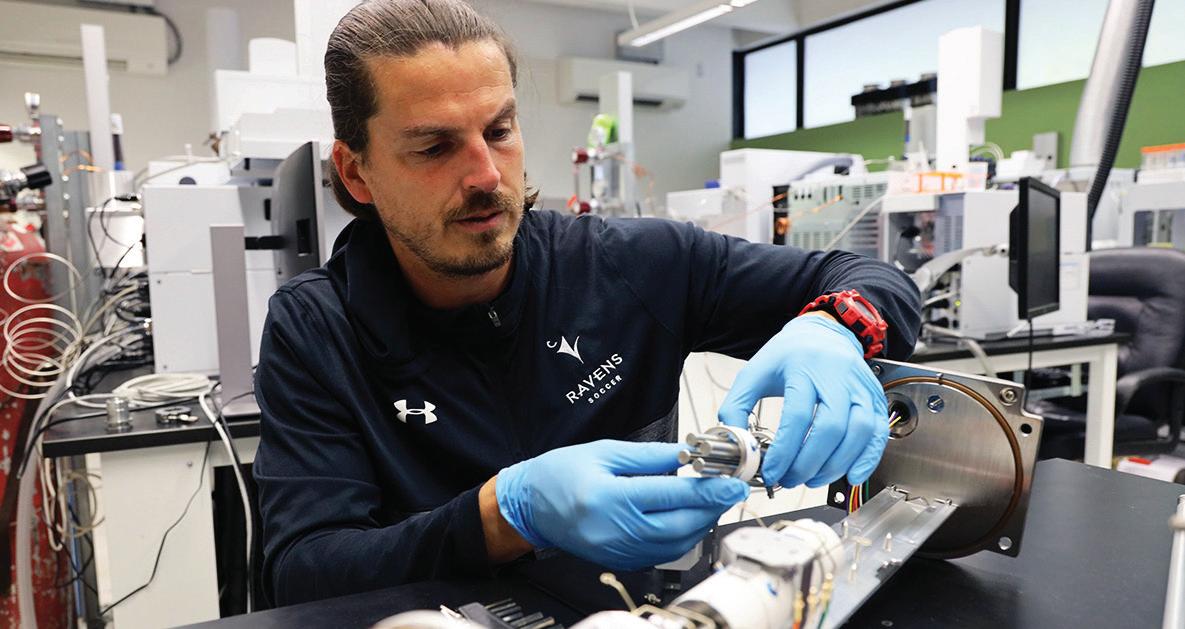
CHALLENGE
23 NATIONAL CAPITAL REGION’S TOP EMPLOYERS 202 3
what’s possible
Carleton University lab technicians create innovative products to support important research.
full-time staff in Canada of employees are women weeks, maternity leave top-up pay weeks, starting vacation allowance 2,516
53% 17 4
Equity and reconciliation are key pillars at CASO Y
vette Uwitonze fled a genocidal civil war in Burundi in East Africa 20 years ago. Now, as the equity, diversity & inclusion child protection worker at the Children’s Aid Society of Ottawa (CASO), she understands the complexities when a Black child comes into care.
“This was initiated to help and work with, as well as highlight, the importance of cultural traditions for Black racialized children. We’re looking to change and better serve our communities,” Uwitonze says.
CASO began mapping a new strategic plan five years ago and wanted it anchored in community. The majority of approximately 400 children in care are Black, racialized, First Nations, Inuit and Métis, so that led to a different model, explains Kelly Raymond, executive director.
“The foundation of our house is predicated on two of the most critical strategic pillars, which are equity, diversity and inclusion,
and reconciliation,” says Raymond. “What that means is all our initiatives, programs, activities and work flows are embedded through equity and reconciliation.”
Reconciliation was designated a separate pillar because it’s both about equity and child welfare and about new federal legislation that gives First Nations, Inuit and Métis communities opportunities to create their own child welfare systems, Raymond explains.
“So, the reconciliation pillar is our commitment to honour that potential,” she adds.
Raymond says the other two pillars of CASO’s strategic plan are excellence and innovation, and partnerships and collaboration.
While staff went through the new plan process, something else became clear.
“We have a serious problem. We primarily serve First Nations, Inuit, Métis and Black, racialized children, youth and families, but we were over-represented by a majority of white staff. We were committed to ensuring our staff are reflective of the communities we serve,” Raymond says.
Indigenous, visible minorities, LGBTQ+ and people with disabilities were also significantly under-represented.
“So that’s where the equity hiring initiative identified and prioritized employment opportunities. Implementation started
slowly during the pandemic but we fully launched it officially in April 2022,” says Raymond.
Uwitonze has been with CASO for five years in such areas as violence against women and francophone units but quickly applied when the position of equity, diversity & inclusion child protection worker was posted.

“Luckily I got it,” she says.
“Events like the tragic death of George Floyd and Black Lives Matter and what it meant to be a Black person in the pandemic showed we needed to make things happen.
“I am just one person but we’re growing and we’ve put the emphasis on working better with the
24 NATIONAL CAPITAL REGION’S TOP EMPLOYERS 202 3
Children’s Aid Society of Ottawa staff presents EDI Above and Beyond award.
“Events like the tragic death of George Floyd and Black Lives Matter and what it meant to be a Black person in the pandemic showed we needed to make things happen.”
— Yvette Uwitonze Equity, Diversity & Inclusion Child Protection Worker
city’s growing diversity.”
Raymond adds: “I think what’s changed in our culture is that diversity is recognized for the value and richness it deserves and each of us plays a role in bettering the services we provide.”
Matching children within their culture means recognizing


the importance of religion and language as well as ethnicity, says Uwitonze.

“For example, if a family is from the Congo, we make every possible effort to involve a worker who speaks the language and knows the cultural identity,” she explains. “Or when a child is religious, making

sure they have community support. So, what are a child’s values and how do we best serve them?”


Raymond adds that with the equity hiring initiative, 45 positions have been filled to start meeting the needs Uwitonze outlined.
“We recently held a staff

barbecue and noted how diverse the staff was compared to five years ago,” Raymond says. “The representation is a reflection of who we serve. The reflection is knowing we’ve helped improve the work and service children, youth and families can expect, and that will continue.”

25 NATIONAL CAPITAL REGION’S TOP EMPLOYERS 202 3 JOIN OUR TEAM REJOIGNEZ NOTRE ÉQUIPE T h e C h i l d r e n ' s A i d S o c i e t y o f O t t a w a i s c o m m i t t e d t o b u i l d i n g a d i v e r s e a n d i n c l u s i v e w o r k f o r c e . L a S o c i é t é d e l ' a i d e à l ' e n f a n c e d ' O t t a w a p r e n d l ' e n g a g e m e n t d e s e d o t e r d ' u n e f f e c t i f d i v e r s e t i n c l u s i f . www.casott.on.ca
Children’s Aid Society of Ottawa staff host a booth at Capital Pride.
full-time staff in Canada weeks starting vacation time paid personal days fundraised by employees for children and youth in care 425 4 5 $30,000+
Making an impact inspires employees at CICan
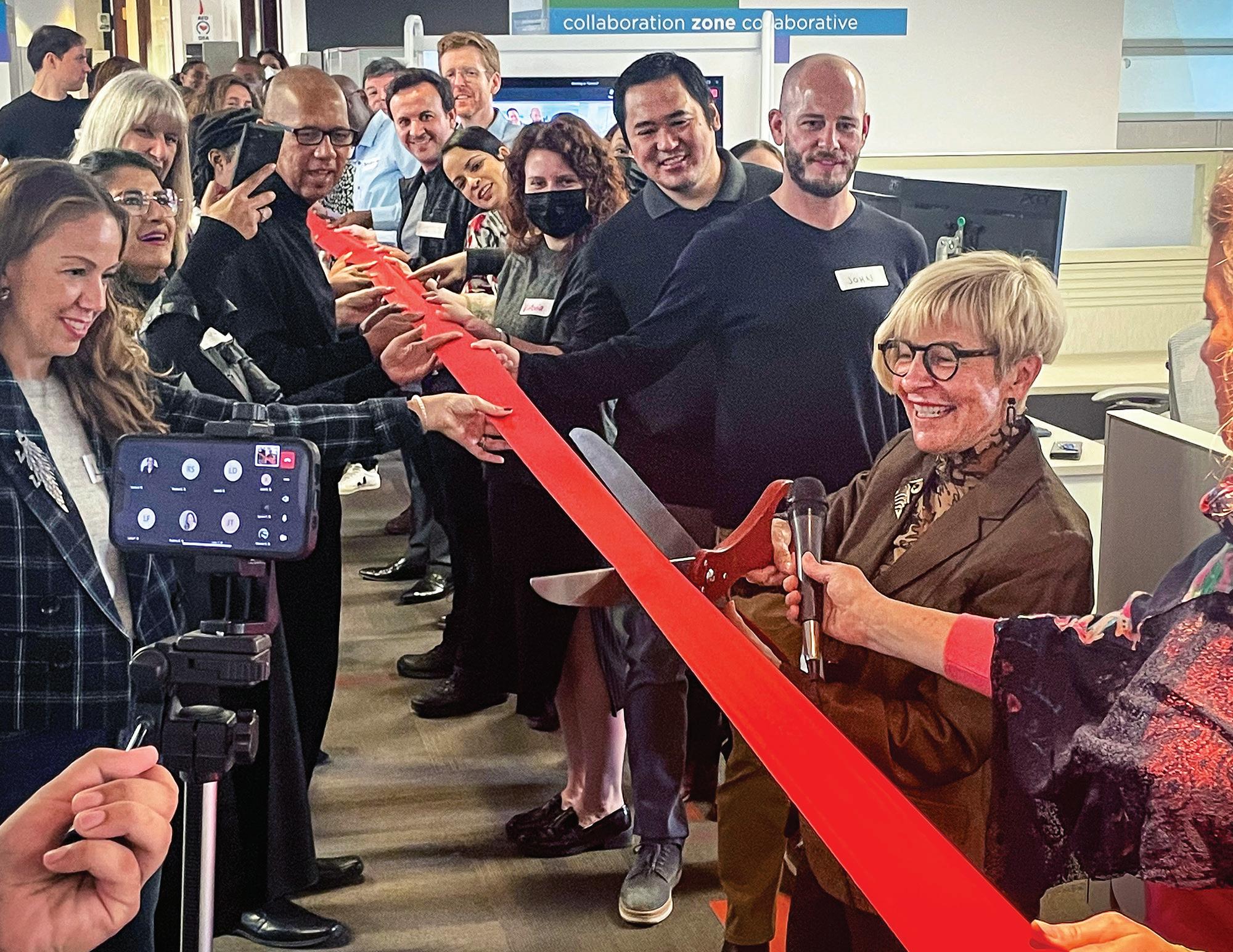
Taranjeet Manchanda left his native India in 2019 to complete an advanced diploma in accounting and finance at George Brown College in Toronto. But his career aspirations changed after student advocacy work introduced him to Colleges and Institutes Canada, known as CICan, an Ottawa-based non-profit that represents over 140 post-secondary institutions across the country.
“I was able to see the zeal and passion their employees had to make an impact on education in our colleges and institutes,” says Manchanda, a program officer. “I was really interested in being able to work for an organization that impacts lives every day.”
Founded in 1972, CICan is dedicated to improving the lives of individuals and communities by strengthening the country’s publicly funded colleges, institutes, polytechnics and Québec CEGEPs. As well, the organization’s international programs link Canadian institutions with educators, employers and labour leaders in several developing countries in order to improve the quality of education. CICan also co-develops and implements programs that support gender-sensitive, demand-
driven, practical learning opportunities that benefit local economies.
“If you ask me what makes our organization so successful, it’s our employee engagement,” says president and CEO Denise Amyot. “We care about our people. We support them from the moment they apply. We support them during their onboarding and we support them while they work for us.”
During onboarding, new hires have an opportunity to meet with Amyot as well as executive-level
employees and senior managers with every team. “I meet them in small groups of four or five,” she says. “I call it cross-fertilization, which is very positive for the organization.”
Manchanda says he has felt supported by his managers in a number of ways. “We have weekly check-ins and one-on-ones so you can talk about your career,” he says. “We have performance goals where we set objectives for the current year. We also talk about future goals, your career paths and
educational paths. The conversations are very candid and organic.”
He also appreciates CICan’s opportunities for growth within the organization. “If I want to learn something new and acquire different skills, I can apply for other positions,” he says. “I can talk to managers and they’re very supportive.”
The organization offers various supports for professional development. “We do collective training for our staff,” says Amyot. “For example, one of our latest was
26 NATIONAL CAPITAL REGION’S TOP EMPLOYERS 202 3
Denise Amyot, president and CEO, opening the newly renovated office space at Colleges and Institutes Canada.
“We care about our people. We support them from the moment they apply.”
— Denise Amyot President and CEO
on our sustainable development goals because we wanted our staff to know what the goals were all about and we wanted them to integrate them into their work. This is the way to retain employees.”
Amyot has led the organization through a period of rapid growth


since joining in 2013. Lately, she has introduced significant changes to where and how employees work. “We have developed a hybrid work policy, but we decided not to ask for a specific number of hours or days in the office,” she says. “We decided to rely on their good judgment.


We were able to work remotely full-time for the past two years without questioning whether they were working, so what’s different now?”
She has also transformed the work space. “We eliminated enclosed offices,” says Amyot. “We re-configured the entire office with
more meeting rooms and individual stations. We have an online system which allows you to reserve a desk or meeting room before arriving. All you bring is your laptop. You don’t need anything else. There are two screens at each station besides your laptop.”

27 NATIONAL CAPITAL REGION’S TOP EMPLOYERS 202 3
Futureproofing communities. Together.
Bâtissons des communautés à toute épreuve. Ensemble.
The office space at Colleges and Institutes Canada has meeting rooms and individual stations.
full-time staff in Canada of employees are women weeks maximum vacation allowance of executive team are women 147 67% 5 80%
Building security through inclusion at CSE

When you’re working for the organization responsible for keeping Canada’s information systems safe and secure from domestic and foreign cyber threats, you might expect your workplace to be ultra-serious, even dour.
That’s certainly not the case at the Ottawa-based Communications Security Establishment (CSE), where employees enjoy a supportive, inclusive culture and a long list of extra-curricular activities, from sports to music to board games and Pride parades.
“My favourite thing about CSE is that while you’re always kept busy with your regular work, there are tons of activities and groups you can join for basically any interest you might have,” says Paige Prosper, who works as an internal communications advisor. “There’s really something for everybody.”
Prosper herself participates in a board game group, plays volleyball
in a lunchtime league and heads CSE’s Pride Network, one of many affinity groups for different communities within the organization.
“My role, in part, is focused on equity, diversity and inclusion,” she says. “So I help a lot of groups across the organization create and put out messaging related to diversity and inclusion efforts.”
These groups are central to the organization’s culture, says Heather Simmie, CSE’s acting director general of human resources.
“We have a spectacular network of affinity groups focused on
women in cyber intelligence, persons with disabilities, neurodiversity, racialized and Indigenous people,” she says. “These are employee-driven groups that have come together and created a sense of community themselves. And they’ve become incredible advocates for change.”
Prosper’s role includes planning events for these groups. “We’ve done Pride parades around our facility and educational sessions to talk about gender and sexual identity, use of pronouns, things like that,” she says. “For EmbRACE, our group for racialized employees,
we’ve held sessions on what it’s like being a Black employee in the government.”
Simmie is proud of the fact that two members of the EmbRACE group won a Government of Canada award for their work crafting and delivering a presentation on the experience of being Black in Canada.
“It started here, and now they’re offering it to broader audiences,” she says. “It’s a hard presentation to hear, but it sparked an incredible conversation in our department and across the federal government, and we couldn’t be
28 NATIONAL CAPITAL REGION’S TOP EMPLOYERS 202 3
CSE fosters an inclusive culture with employee-driven affinity groups.
“We really try to make it so that every employee feels like a valued, contributing member, and that they feel welcome and respected.”
— Heather Simmie Acting Director General of Human Resources
3,236
14,418 54% 6
prouder. These affinity groups are absolute powerhouses in terms of pushing for change.”
CSE also offers employees an extensive benefits package and both formal and informal training and mentorship programs.
“We are an organization that values learning and staying
current,” Simmie says. “We are working on some of the world’s most challenging problems – the ones we face today and the ones coming for us tomorrow – and we want people to have the time and space to do that. So we have a blend of global corporate programs and learning plans for each
employee, and great mentoring opportunities.”
Simmie calls CSE one of the greatest organizations that people have never heard of. “It’s a collaborative culture, and super flexible in terms of internal mobility,” she says. “People move to different roles, which helps them find their

passion and learn what the rest of the organization does.
“It’s a place where we take inclusion very seriously,” she adds. “We really try to make it so that every employee feels like a valued, contributing member, and that they feel welcome and respected every day.”

29 NATIONAL CAPITAL REGION’S TOP EMPLOYERS 202 3
The ‘Edward Drake Building’ provides a modern and efficient facility for the CSE.
full-time staff in Canada job applications received last year of executive committee of senior leadership are women weeks, maximum vacation allowance
For Dairy Farmers of Canada, it’s a change of mindset
ulia Buckingham, the first-ever sustainability manager for Dairy Farmers of Canada, remembers the quizzical looks she would get five years ago when she told people she was doing her master’s degree in sustainable food systems.
“A lot of people didn’t know what I was talking about when I tried to explain what sustainable food systems were,” she says. “And now it seems like it’s an everyday conversation topic.”
Like the role of sustainability, Buckingham’s role at Dairy Farmers of Canada has evolved since she started working at the Ottawa-based advocacy group three years ago. She went from implementing the environment module of its national “proAction” plan in her first year to being named its inaugural sustainability manager this summer.
“Now I am overseeing the implementation, monitoring and reporting of our progress toward our goal of net zero by 2050,” says Buckingham, who has always been interested in food and farming, even having her own cake decorating business while in high school.
“This is actually my third role
with DFC and, over the last three years, my job has progressed to the point of what I’m doing now.”
Buckingham’s ascent typifies the kind of employee success CEO Jacques Lefebvre has been keen on developing since assuming the job five years ago. “I wanted us to distinguish ourselves and to be closer to the needs of the employees, the workforce,” Lefebvre explains. “A change in mindset.”
One of Lefebvre’s first tasks was to revamp its human resources department — which at one time
had but one part-time employee — and instead establish and grow a “people and culture” department to the three full-time staff it is today.
“I needed to hire some people in ‘people and culture’ who actually understood the mindset of employees from baby boomers to Generation Zs and would help me create the environment to attract and retain top talent and prepare for succession planning,” Lefebvre explains.

“That’s something that was really important to me because, as an employer, we’re investing in
talent to help them develop and grow. Sometimes you lose them and that’s okay. I accept that. But for me, I wanted to create the conditions by which they would want to stay.”
So Dairy Farmers of Canada underwent a “culture shift,” he says.
One example of that shift was holding regular all-staff video meetings. “I’m from the school of thought that I’d rather be transparent about the challenges we face, whether it’s funding, whether it’s managing under COVID, whatever
30 NATIONAL CAPITAL REGION’S TOP EMPLOYERS 202 3
Dairy Farmers of Canada encourages employees to connect with different teams across the organization.
“I wanted us to distinguish ourselves and to be closer to the needs of the employees.”
— Jacques Lefebvre CEO
the issue is, rather than trying to keep it quiet and then things percolate and people lose trust in their senior executive team,” Lefebvre says.

He is a firm believer in hiring people who complement his strengths rather than duplicate them. “We invest in campaigns,
we invest in government relations, marketing,” Lefebvre says. “Well, investing in staff is just that, an investment that pays dividends. So we’re going to try something and we’ll see if it works. If people like it, then we can say that we’re at the forefront of how you do ‘people and culture.’ If it doesn’t
work, we'll reset and we’ll try something new.”
So far, it appears to be working.
Buckingham – who runs the Net Heroes, a group of employees from each department who meet monthly about sustainability issues – is seeing the company’s sustainability profile, and the



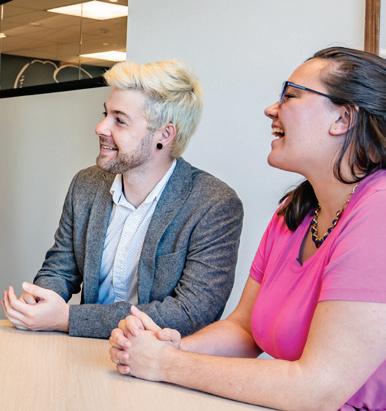
department, grow.
“It’s been really exciting to be at DFC during this time, and to be given that freedom to bring my ideas forward to explore different pathways,” Buckingham says. “And so I think that just means that the future is open to even more possibilities.”
We are proud to be selected as one of the National Capital Region’s Top Employers

31 NATIONAL CAPITAL REGION’S TOP EMPLOYERS 202 3
EVERY EMPLOYER IS ONLY AS GOOD AS THEIR EMPLOYEES
Dairy Farmers of Canada engages employees in planning discussions for strategic initiatives.
full-time staff in Canada weeks, maternity leave top-up pay weeks, maximum vacation allowance total annual training and development budget 76 17 6 $75,000
Evolugen thrives on its employees’ energy
When Chanel Lacroix took her first maternity leave at Evolugen, she was worried she might miss out on opportunities for advancement at the Gatineau-based renewable energy company. Instead, she was given a promotion during her leave.
“It shows that taking that time away didn’t affect my career, and that they believed in me and knew I would come back,” she says.
Lacroix has had plenty of opportunities for advancement in her seven years at Evolugen, including a mentorship program for new hires that allowed her to work with different teams. “It really helped me to understand the business and develop my career,” says Lacroix, who started as an analyst and is now manager of partnerships and external relations.
“It’s a very dynamic environment,” she adds. “I have the chance to collaborate with so many people and work on so many projects that the days are never the same, and I like that. We also have an open workspace where the CEO and executive team sit with everyone else, and it’s easy to speak to them if I have a question or something
to share.”
Jonathan Lee, Evolugen’s vice-president of human resources, maintains that the company’s vibrant culture exists because of the forward-looking nature of the business.
“We are one of the largest owner-operators of renewable power assets in Canada, and we’re always trying to be innovative and look at problems in fresh ways, which is exciting,” he says. “We

try to harness that entrepreneurial spirit for all our employees, and give them opportunities to experiment and play and figure out how to do things differently.”
During the worst of the pandemic, most employees worked from home, except for those keeping track of ever-changing energy prices and requirements across the country on the company’s trading floor. But Lacroix says that Evolugen’s
flexible schedules meant working remotely didn’t present a huge challenge.
“We always had the trust of our supervisors,” she says, “and the understanding that it can be challenging sometimes to balance work and personal life.”
“People can’t do their best work unless they can really be themselves,” says Lee. “So one of our big focuses was just to make sure people were OK through the
32 NATIONAL CAPITAL REGION’S TOP EMPLOYERS 202 3
Evolugen employees at its Masson hydro facility in Gatineau, Québec.
“We’re always trying to be innovative and look at problems in fresh ways, which is exciting.”
— Jonathan Lee Vice-President of Human Resources
pandemic. We are blessed to have so many intelligent and creative people who are really committed to the mission of the organization. We succeed because of our people, so it’s first and foremost about taking care of them.”
Besides leadership training and flexible work hours, Evolugen

offers employees a generous benefits package including health care and mental health services, as well as a volunteer program, extensive sports and fitness programs and even ice cream days.

“The benefits are amazing,” Lacroix says. “We have competitive wages, bonuses and a pension plan,















and in the office we have a gym, a bike room, nice showers and free boot camp, yoga and spinning classes. It makes the day-to-day experience more interesting.”
Lacroix also appreciates the company’s new energy-efficient building, which offers expansive views of the Ottawa River and






the Parliament Buildings. “The office is so beautiful, it makes your day to come here,” she says.

“On the third-floor terrace we have a community garden where people volunteer. And we give the vegetables we grow to a non-profit organization, which is pretty great.”

33 NATIONAL CAPITAL REGION’S TOP EMPLOYERS 202 3 Advancing Canada’s Low-Carbon Future Together evolugen.com
Evolugen employees on site at the company's Prince Wind Farm.
full-time staff in Canada charities helped last year mental health practitioner benefit years, longestserving employee 244 146 $1,000 39
Hydro Ottawa powers connections among employees
With winds up to 190 km/h, a derecho wind storm devastated Ottawa last May, causing extensive damage to the electrical distribution system. Hydro Ottawa crews worked for days to restore power to more than 180,000 customers and repair more than 400 damaged poles. Restoration was the equivalent of doing four years’ worth of construction work and emergency repairs in 14 days.
“At one point, we had more than 300 additional people from other utilities and contractors on the ground helping us restore power back to the community,” says Maureen Chude, manager, contractor management. “And as a company, we banded together to support our crews and contractors in different ways, including making sure they had food at their worksites and getting contractors to where they needed to be.
“I think this demonstrated the community mindset we have as an organization. It was very clear
this was a collective problem that we all needed to come together to solve. There was no hesitation from employees in giving up personal time and working long hours to get our customers and our community back to where it needed to be. It very much felt like a team.”
This is something Chude says she has felt since joining Hydro Ottawa in 2019. “There is a sense of community. It is important when you’re new to an

organization to feel comfortable enough to go to anyone for help. I found that to be a big part of the culture here,” she says. “Everybody is always willing to help. You come in every day and work doesn’t seem like a chore, because you have people you are comfortable to talk to and you don’t feel so lonely in the execution of your work.”
Trevor Freeman, supervisor, key accounts, says he is grateful to also feel this sense of connection with the wider community.
“In my role, I deal with a lot of our large commercial customers and support them on the innovative things they’re doing to lower their greenhouse gases or to achieve net zero targets or to take on big energy projects,” he says.
“So, the level of conversation that I get to have with our customers is really a great spot to be in. Every business, every resident, every commercial entity in our service territory, we’re a part of their lives and we get to have that
34 NATIONAL CAPITAL REGION’S TOP EMPLOYERS 202 3
Maureen Chude, manager, contractor management and Trevor Freeman, supervisor, key accounts, at Hydro Ottawa.
“It is important when you’re new to an organization to feel comfortable enough to go to anyone for help.
I found that to be a big part of the culture here.”
— Maureen Chude Manager, Contractor Management
interaction with them.”
Hydro Ottawa also extends its support to residents and organizations across the city. A recent charity golf tournament, for example, raised close to $150,000 for the Ottawa Food Bank, while an employee-led committee raises funds each year for the United
Way. The organization gives employees the opportunity to volunteer one day annually during the work week with any registered charity.

Hydro Ottawa also works with The Capital Fair to open the fair a day early for a private event to give children and adults with
intellectual or physical disabilities, along with their families and caregivers, the opportunity to experience a fun day at the fair with smaller crowds, reducedspeed midway rides and volunteers to help guests on and off the rides.
“As an employee, it’s important for me to know that the company
supports me in being able to give back and I don’t have to do that all after hours," says Freeman. “It also shows me that it is an organization that believes and cares about similar things that I believe in and care about. It’s not just about the core business, but about being a good community member.”
35 NATIONAL CAPITAL REGION’S TOP EMPLOYERS 202 3
Hydro Ottawa employees can take one volunteer day every year to support the community.
full-time staff in Canada local charities supported last year employee diversity groups campuses with wellness amenities 651 11 4 2
Learning and growth rule at the Library of Parliament
While attending Carleton University in the mid-2000s, Andrés León spent two years working as a parliamentary guide with the Library of Parliament. Born in Bogotá, Colombia, and raised in Quispamsis, N.B., he speaks English, French and Spanish fluently and enjoyed meeting visitors from all over Canada and beyond as they learned about Parliament.
The Library is the Parliament of Canada’s knowledge centre, where a diverse, committed team of employees plays a critical role in supporting democracy.
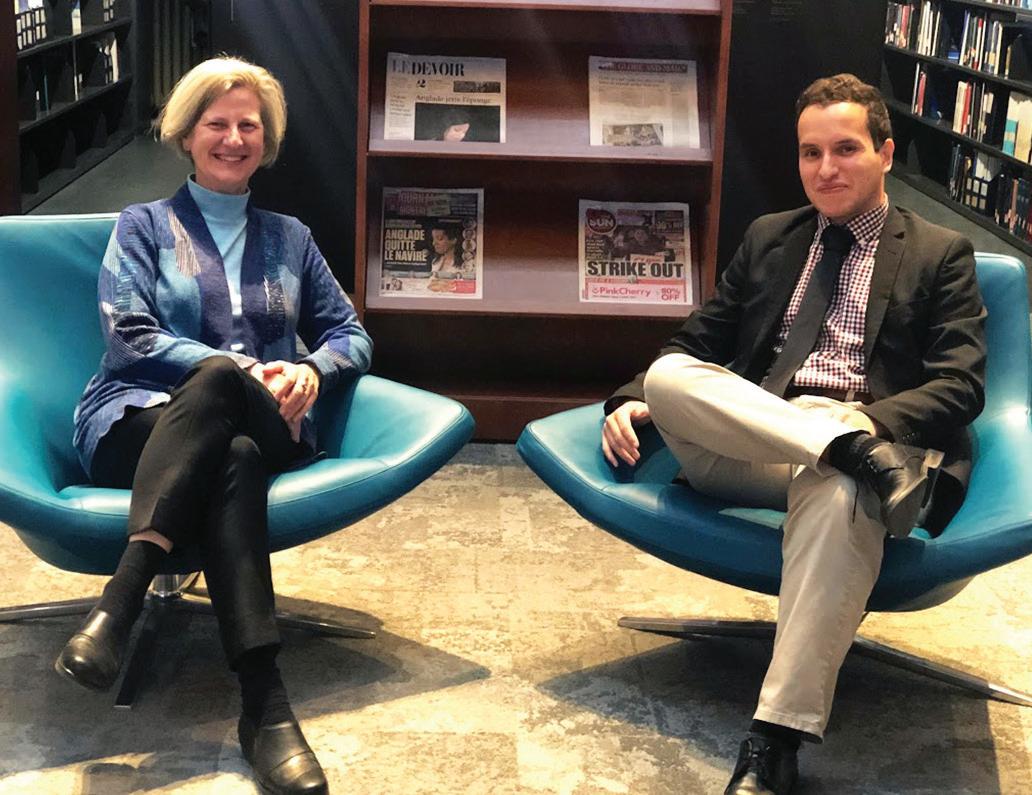
In September 2018, León began an 11-month paid internship in the Library’s international trade and defence section of the Parliamentary Information, Education and Research Services. Then, while earning a master’s degree in public and international affairs from the University of Ottawa, he worked part-time at the Library as a student and research assistant.
In January 2022, León became a full-time analyst in that same section. “At the Library, there are
lots of opportunities to move to different sections to learn new skills,” says León. “The Library encourages you to harness the skills you have and develop and strengthen new ones.”
As an analyst, León provides services such as fulfilling research requests and drafting reports. His focus is on policy issues related to different international affairs topics, and he provides comprehensive, authoritative analyses to support parliamentarians in their work, regardless of their political
affiliation. “It’s great to work in a non-partisan environment in a client-focused role where you’re always learning,” he says.
León enjoys participating in all his employer has to offer. He previously played on the Library’s soccer team against other parliamentary teams, and he has taken part in trivia contests organized to raise funds for the community. “The social activities are a great way to meet colleagues from other sections and divisions of the Library,” he says.
There may be no one more passionate about working at the Library than Heather Lank, who was appointed parliamentary librarian in 2018 after a long career in parliamentary administration. “I was looking for a change that would allow me to stay on Parliament Hill, serve the Senate and the House of Commons, work in a bilingual environment and have a learning and knowledge focus,” she says. “I love my job, and I adore the Library.”
36 NATIONAL CAPITAL REGION’S TOP EMPLOYERS 202 3
Heather Lank, parliamentary librarian, and Andrés León, analyst, at the Library of Parliament.
The Library encourages you to harness the skills you have and develop and strengthen new ones.”
— Andrés León Analyst, International Trade and Defence Section
The Library includes five branches spread across Parliament Hill, right in the hub of parliamentary activity. Lank and León work in an office building in downtown Ottawa that’s a two-minute walk from Parliament Hill. “It’s a very appealing physical workspace with nice offices and boardrooms, and
it’s right near the river and close to public transit and bike paths,” says Lank.
Lank says León’s career path is similar to that of many Library employees. “We invest heavily in our employees, whether they come in as parliamentary guides, interns, junior librarians, research

techs or in more senior roles,” she says. “We’ll pay for them to attend conferences, seminars and webinars – whatever they need to be effective, to grow, develop and serve Parliament.”

In addition to giving employees the tools to stay up to date in their field, the Library also invests in
mental health supports such as resilience and mindfulness training. “We value who our people are and who they can become, not just their knowledge,” says Lank. “We recognize that everyone is part of an external community and a bigger life – and that’s really important to us.”
37 NATIONAL CAPITAL REGION’S TOP EMPLOYERS 202 3
Library of Parliament employees attending an event for their workplace charitable campaign.
full-time
employees have 10+ years of service weeks, parental leave salary top-up weeks, starting vacation allowance 413 150 37 4
staff in Canada
Mutual respect brings rewards at Nelligan Law
Mia Hempey was looking for a challenge when she joined Nelligan O’Brien Payne LLP in 2016. An entrepreneur and founder of a local technology training company, Hempey had sold her business when she responded to the firm’s posting for a managing director.
“They wanted me to look at things with fresh eyes,” she says, “examine the culture and find efficiencies.”
Founded in 1969, Nelligan’s practice areas cover everything from personal injury to intellectual property. With 53 lawyers and 57 staff members, the firm has acquired a reputation as a forward-thinking and innovative organization. Hiring a non-lawyer to run the operation was typical of its out-of-the-box thinking.
As one of her first initiatives, Hempey went to work on creating an employee-centric culture with an emphasis on teamwork. “I wanted to democratize the firm,” she says.
It didn’t happen overnight. Hempey’s efforts had just started to make an impact when Claire
Boychuk left the firm after one year to take a position as a policy advisor with a national advocacy group in Ottawa. But after two years, she rejoined Nelligan as an associate lawyer.
“I was torn between policy and litigation,” she says, “but I finally realized that I’m a lawyer at heart.”
Boychuk was well aware from her friends at the firm of the changes that Hempey’s efforts had made in the way it conducted its practice.
“It’s what brought me back to the firm,” says Boychuk. “People
here are ambitious, but they’re also open and generous. They’re building a workplace that’s warm and human, in which your success is my success.”

Toward this end, Hempey has taken several steps to build a culture of cooperation. She initiated a staff retreat, for example, in which paralegals, executive assistants and other staff enjoy a day of professional development, arts and crafts and group activities, along with a festive lunch as a way of showing the firm’s appreciation for their efforts.
“Most firms have a lawyers’ retreat,” says Hempey, now the firm’s CEO, “but it’s rare for the staff to have a retreat. The lawyers fully support the initiative, though, and cope on their own for the day.”
During the Freedom Convoy truckers’ protest that occupied downtown Ottawa in February 2022, the firm offered to foot the bill for any employee who wanted to move to a hotel for a weekend to escape the disturbances. When the pandemic forced the firm to send its employees home,
38 NATIONAL CAPITAL REGION’S TOP EMPLOYERS 202 3
Nelligan Law employees enjoying entertainment at the firm’s ‘Family Fun Day 2022’ with their families at TD Place.
“It’s reassuring to know that I can be the parent that I want to be and the lawyer that I want to be.”
— Claire Boychuk Associate Lawyer
Nelligan gave each of them a $5,000 bonus at the end of the year as recognition for the hard work involved in the transition of business operations to online.
“On 12 hours’ notice, everyone went home and learned how to use the technology that they needed to work,” says Hempey. “Everyone
pulled together. We had no choice. We had to figure out what to do.”
The flexibility in working arrangements that resulted from the pandemic has also contributed to the culture of mutual respect at Nelligan Law.



“I have a young child,” says Boychuk. “Fortunately, Nelligan
is very flexible. I can pick up my child from daycare every day at 4:30 and still get a lot more done working at home.

“It’s reassuring to know that I can be the parent that I want to be and the lawyer that I want to be.”
Amid Nelligan’s employeecentric culture, the firm still has

to generate enough income to survive. So how has it performed financially since Hempey brought in the new policies?
“Last year was one of the most profitable in the firm’s recent history,” she says. “When you put trust in people, results happen. It’s our competitive advantage.”




39 NATIONAL CAPITAL REGION’S TOP EMPLOYERS 202 3
Alain Azar, articling student (left), and Craig O'Brien, partner, attending ‘Family Fun Day 2022’ hosted by Nelligan Law.
full-time staff in Canada years, average age of all employees of equity partners are women employer-paid health plan, with family coverage 110 40 50% 100%
Delivering diverse service is a priority at OCHC S

erving a diverse community of 32,000 tenants in 15,000 homes across the city highlights the need for strong diversity, equity and inclusion (DEI) employee priorities at the Ottawa Community Housing Corp. (OCHC).
“DEI is a wide-ranging topic but it starts at the recruitment stage. It’s a matter of attracting individuals to an organization that aligns with their values,” says Josh Torres, community developer. “DEI is what attracted me to work here.”
Torres explains that the OCHC, which provides social, affordable and subsidized housing in Ottawa, set up an internal “Champions Table” as part of its strategic plan to identify priorities within the organization.
“We put a call to staff at any level who wanted to be part of the conversation and established the Champions Table. Then we narrowed down key diversity, inclusion and equity areas,”
Torres says.
They identified six: women in the workforce, anti-racism pertaining to Black, Indigenous and people of colour, LGBTQ+, mental health and wellness, neurodiversity, and a multigenerational workforce group to help encourage collaboration and understanding across generations. Employee resource groups (ERGs) soon formed.
Heather Jones, an integrated pest management worker, was one of two women hired permanently to the pest management team alongside 21 male team members two years ago.
“Just call me the bug lady,” Jones laughs. “When you look at
exterminators, it’s predominantly men. I was the only female and there were a few hiccups along the way, but now there are two women and a female manager.”
Jones was involved in social work for 20 years, with the last three as a registered psychotherapist, before joining OCHC, although she had worked with the organization many times. When the chance came to join the pest management group, she quickly switched professions.
“I learned through professional training and with terrific help from my accredited colleagues,” she says. “It was a no-brainer because I believe in what OCHC does, which is housing for
everybody. I still get to help people because I meet people where they’re at. It’s fantastic!”
Her years in social work offer a different approach toward tenants.
“Sometimes you need a softer, gentler approach and I think my experience as a therapist takes down the stigma and shame around having bugs in your home,” Jones says. “I don’t go in as the authoritarian, rather to help.”
Torres notes OCHC works with a variety of people, such as newcomers, refugees or immigrants who speak a multitude of languages. Housing can be in high-rise or seniors’ buildings, townhomes or houses.
“So, part of our vision is to
40 NATIONAL CAPITAL REGION’S TOP EMPLOYERS 202 3
Ottawa Community Housing employees help support an Ottawa Mission food truck event in the community.
“We emphasize hiring people who have lived the tenants’ experiences and speak their language, because that creates a bond and positive relationship.”
— Josh Torres Community Developer
make sure we’re reflective of the communities that we serve,” says Torres. “We emphasize hiring people who have lived the tenants’ experiences and speak their language, because that creates a bond and positive relationship.”
OCHC provides mandatory DEI training to all employees, as well as
hosting events with guest speakers specializing in DEI.
Torres and a group of residents from different buildings meet to discuss events or outings that would strengthen their communities or offer different experiences.
One outdoor outing took them to the outskirts of Ottawa. “Going
to a pumpkin patch and everyone picking a pumpkin was a simple thing we did, but it brought people together from different backgrounds to enjoy this unique Canadian experience,” Torres says. Another time, the community development team at OCHC delivered food and vital


information and checked people’s safety in an Ottawa neighbourhood during a city-wide power outage.
“We firmly believe everyone deserves a home. It’s not a luxury, it’s a necessity, it’s human rights,” Jones says. “We’re trying to ensure suitable, safe, pest-free, stable housing for everyone.”
41 NATIONAL CAPITAL REGION’S TOP EMPLOYERS 202 3
Ottawa Community Housing employees showing their support at the 2022 Capital Pride Parade.
full-time staff in Canada employee resource groups (ERGs) members of ERGs employee engagement hours on OCHC and community projects 437 6 54 700
PPS: putting people at the core of protection
The Parliamentary Protective Service was, in its own words, “created out of a crisis” – the October 2014 shootings on Parliament Hill that left many injured and a soldier on sentry duty dead. Over the past seven years, it has evolved into an organization which aims to be people-centred.
“While crisis is part of our culture, we are learning to focus on people: those who are part of the spaces we protect, and those whom we employ to deliver our mandate.” says chief operations officer Albéric Bilodeau.
The Service was formed with the merging of Senate and House of Commons security services, as well as certain RCMP resources, into one integrated entity tasked with providing protection on Parliament Hill.
Corporal Jacynth Mantha was originally part of the House of Commons security team before amalgamation. “The sense of unity, and that we are one, is a feeling I can’t really describe,” she says.

“There’s always someone there to help you out, whether it’s a front-line person who’s physically there to give you a hand, or an administrative employee who is only a phone call or a short
walk away.”
From professional development and addressing diversity and inclusion to the response to COVID-19 and the Trucker Convoy in Ottawa, Mantha is impressed with how the organization has risen to recent challenges.
“I’m really happy to be part of an organization where I feel a sense of belonging. As an LGBT woman, working for a service whose mandate is protection and
security, I feel that I’m valued. And that makes me get up in the morning and feel excited about moving our mission forward.”
Bilodeau cites a well-known axiom. “I read this in a book once: culture is what you have when no one is looking.”
He says that the Service works “in a high-risk/high-impact/low frequency environment,” meaning that long stretches of business-asusual give them time to anticipate
the next crisis, which makes stress part of the job.
“Our operational employees, be they protection officers, detection specialists or dispatchers, for example, never know what the day might hold in store for them. This is where we’ve shifted to focusing not only on potential threats, but also on our employees themselves,” Bilodeau says. “It’s a focus that goes beyond performance: it’s about mental health, engagement,
42 NATIONAL CAPITAL REGION’S TOP EMPLOYERS 202 3
The Parliamentary Protective Service ensures the protection of the Parliament of Canada across multiple sites.
“While crisis is part of our culture, we are learning to focus on people.”
— Albéric Bilodeau Chief Operations Officer
inclusion, and making sure that employees feel appreciated at work.”
The Service’s challenge with COVID-19 was providing support for its operational staff, who make up 85 per cent of the organization’s employees. At the same time, remote work options had to be
arranged for the rest of the staff.
Bilodeau talks about the urgency that went into acquiring personal protective equipment and COVID19 testing kits, and initiatives like weekly coffee chats, mental health and wellness checks, or delivering IT equipment to employees to make sure both operational and

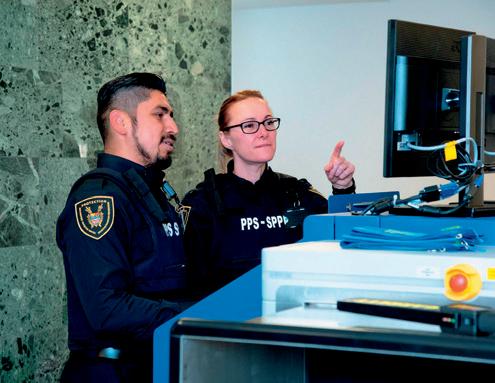


support staff were “feeling valued, whether working from home or coming in to work”.
When lockdowns began, Mantha was training employees and she praises the Service for how it supported them. “There’s a sense of togetherness that really made us bond. Today, new employees feel

that they’re coming into something that was created from strong foundations.”
Bilodeau says that if the Service’s current approach to delivering its mandate had to be summarized in five words, these would be “people, engagement, belonging, partnerships, and learning.”


NATIONAL CAPITAL REGION’S TOP EMPLOYERS 20 THE PARLIAMENTARY PROTECTIVE SERVICE TAKES PRIDE IN ENSURING THE PROTECTION OF CANADA’S PARLIAMENT Join our team, visit pps.parl.ca/careers
The Parliamentary Protective Service supports its operational team with mental health and wellness checks.
of the workforce is front-line years, average age of all employees paid sick days role-related tuition subsidies 85% 35.4 15 100%
At Qlik, an inclusive culture welcomes top talent
Site reliability engineer
Jennifer Liu fell in love with the Qlik product before she discovered the organization.
“I went to the website and demoed the product and the way it worked was very intriguing,” says Liu. “Then I went to the ‘About’ page and was excited to see that Qlik was founded in Sweden and grew from small beginnings into this large global organization.”
Qlik’s cloud data and analytics platform provides data integration and analytics to help organizations improve their level of data literacy and use their data to make good decisions. Qlik’s Ottawa office is primarily focused on research and development. The company as a whole does business in more than 100 countries, serving more than 38,000 active customers around the world.
“At Qlik, we have a constructive, can-do environment,” says chief technology officer Mike Potter.
“The people are very creative, very smart and they want to do good work. It’s infectious!”
One way Qlik employees in Ottawa are introduced to the culture is through the buddy program. Every new employee is partnered with someone to introduce them around the office. They get to know people on other teams, and they have someone to guide them, take them to gatherings and answer questions.
Since the pandemic, Potter says, Qlik has adopted the philosophy that people should come into the office to meet and are free to do individual work at home. When Qlik employees come to the office, they have a “town hall” where
people can eat their lunch, visit the espresso machine or take part in trivia events or Xbox gaming.
Popular gatherings include a catered lunch on Wednesdays and charitable events. Holiday themed fun, such as a pumpkin carving in October, ends with an auction to raise money for charity, and in December, employees organize Christmas hampers, canned food drives and more.
Qlik also embraces the community. In Ottawa, in partnership with educational institutions, there are co-op and new graduate programs where people learn and develop on the job. Qlik plays a role in helping the global community by supporting

non-governmental organizations. The corporation was able to help the United Nations with its analytics during the COVID-19 crisis.
Qlik also has a strong culture of professional development supported by a career progression program. When Liu joined Qlik in 2016, her manager asked about her goals. What was she striving for?
“I wanted to eventually move to a more senior role so he let me know what skillsets were required to achieve that level of performance,” says Liu. Working with her manager, she created a career plan and was successfully promoted during a following
44 NATIONAL CAPITAL REGION’S TOP EMPLOYERS 202 3
Qlik employees celebrating the reopening of the Ottawa office.
“Qlik’s culture embraces diversity. People have the opportunity to work collaboratively across oceans and continents in an integrated environment with a great global team.”
— Mike Potter Chief Technology Officer
promotion cycle.
In 2019, Liu was one of three employees from Ottawa who had an opportunity to join a team in Lund, Sweden, for three months. And three employees from Lund came to Ottawa. “It was a great cross-collaboration between teams. Everyone was open and helpful. I
learned so much about working with people in another culture,” she says.


Qlik employees thrive on change, staying up to date on current technology by attending major technology conferences and customized training from external suppliers delivered in-house.
Recently, Liu took on a lateral move within Qlik to expand her skillset and development. She has found her new colleagues welcoming and excited for her to join the team.
New and different perspectives are valued at Qlik. The organization’s employee resource groups
foster and listen to employees of different backgrounds and abilities and support their initiatives.
“Qlik’s culture embraces diversity,” says Potter. “People have the opportunity to work collaboratively across oceans and continents in an integrated environment with a great global team.”
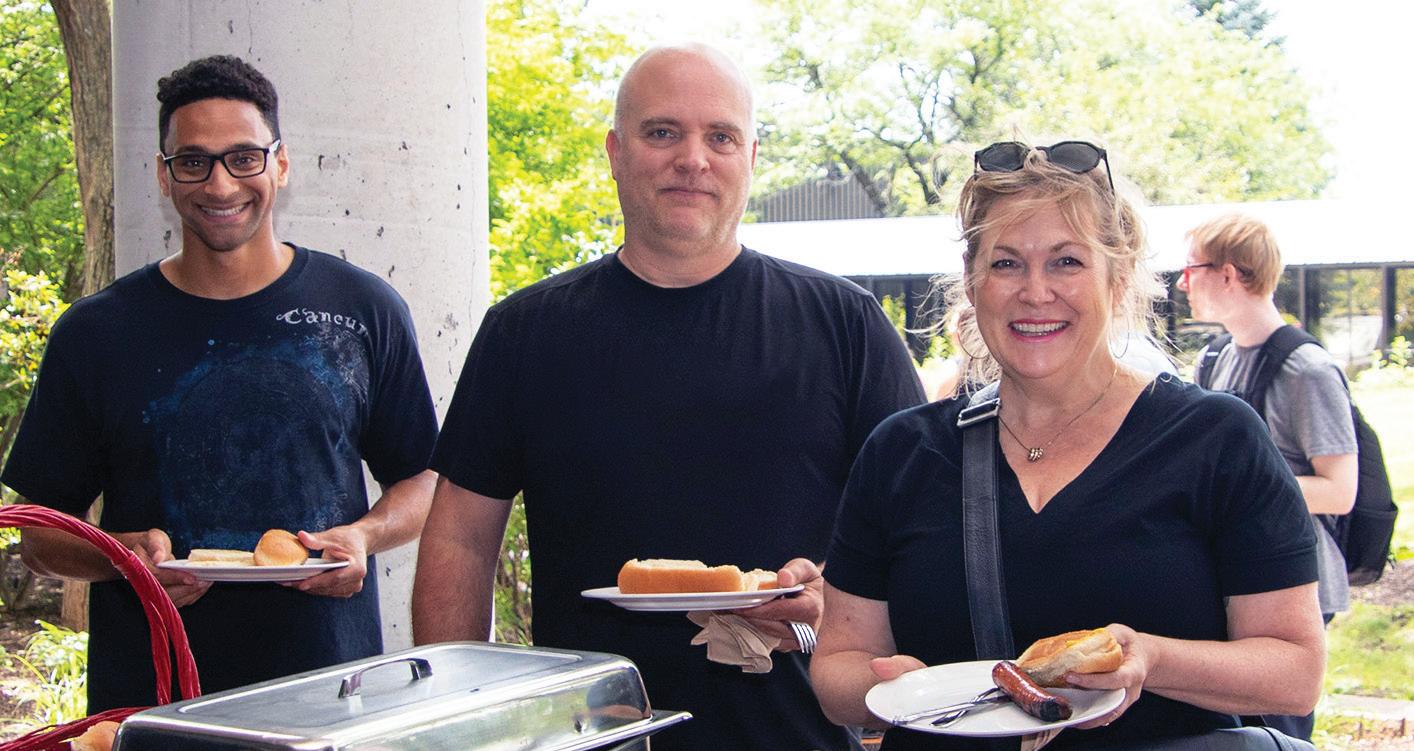
45 NATIONAL CAPITAL REGION’S TOP EMPLOYERS 202 3
Qlik employees enjoying a summer BBQ lunch.
staff in Canada charities helped last year online courses in training
employee referral bonus 203 501 25,000+ $3K-$9K
full-time
portals
Universities Canada helps employees keep learning

Maggie Rodrigues starts Monday mornings with an 8:30 class titled Parliament and Parties. The course on Canadian public policy is core to the master’s degree she’s studying for at Carleton University while continuing to work as a government relations officer at Universities Canada in Ottawa. Not only is her employer flexible about the times needed to attend classes, but generously picks up 75 per cent of the tuition.
“I work on policy and government relations and hope to be able to move up within my team,” says Rodrigues. “All my managers here have had master’s degrees and so I knew that was something I needed to do. Overall, it’s a culture that values learning and growth, which very much aligns with my own values.”
Universities Canada, a membership organization providing university presidents with a unified voice for higher education, research and innovation, is equally
passionate about learning and career development for their employees. Although there had always been a training program, late in 2021 the organization created the new position of learning and development specialist to be more proactive. Sandra Boisvert held that position for the first year and worked hard to ensure its success.
“We formalized a training cycle that’s closely linked with our performance development cycle,” says Boisvert, now climate initiative manager. “Employees can indicate what kind of training they think would be beneficial and
managers can also recommend training to help their employee either in their current role or to grow into their next one. After meeting with each manager about their group’s needs and looking at the organization’s priorities, we identify and schedule training for the year.”
Training can be in-house, online or external – for individuals, groups or teams.
For example, all leaders took part in training and received a workplace mental health leadership certificate from Queens University. Employees might also enroll in a university program to develop
their career or attend a conference with all expenses paid.
“Last year, all of our staff took training on how to work in high-performing hybrid teams, because we moved to a hybrid model of working,” says Boisvert. “It was a course offered through Queen’s University on best practices that was helpful from both a technology standpoint and a cultural one – such as how to recreate your company’s culture because it needs to look different, and how to really make sure that everyone feels included, no matter where they’re working from that day.”
46 NATIONAL CAPITAL REGION’S TOP EMPLOYERS 202 3
Students and staff at Universities Canada take part in the ‘Amazing Race Canada,’ an adventure reality game show.
“The success of the organization depends on the success of its employees and their ability to do their jobs, but also to grow in their roles.”
— Sandra Boisvert Climate Initiative Manager
After two years of working online because of the pandemic, Boisvert felt that taking some training together helped people feel supported right when they were coming back into the office.
“We had a lot of new staff who had joined during that time as well, so it just brought us together
and got us ready for the next step,” says Boisvert. “Whenever we do staff meetings, we highlight what’s coming up in terms of training. We’ve booked more training in the past year than ever.
“The success of the organization depends on the success of its employees and their ability to do
their jobs, but also to grow in their roles.”
The renewed emphasis on learning also re-energized a popular internal French language program that had lapsed.
“We’re a bilingual organization, so we help employees become more comfortable working
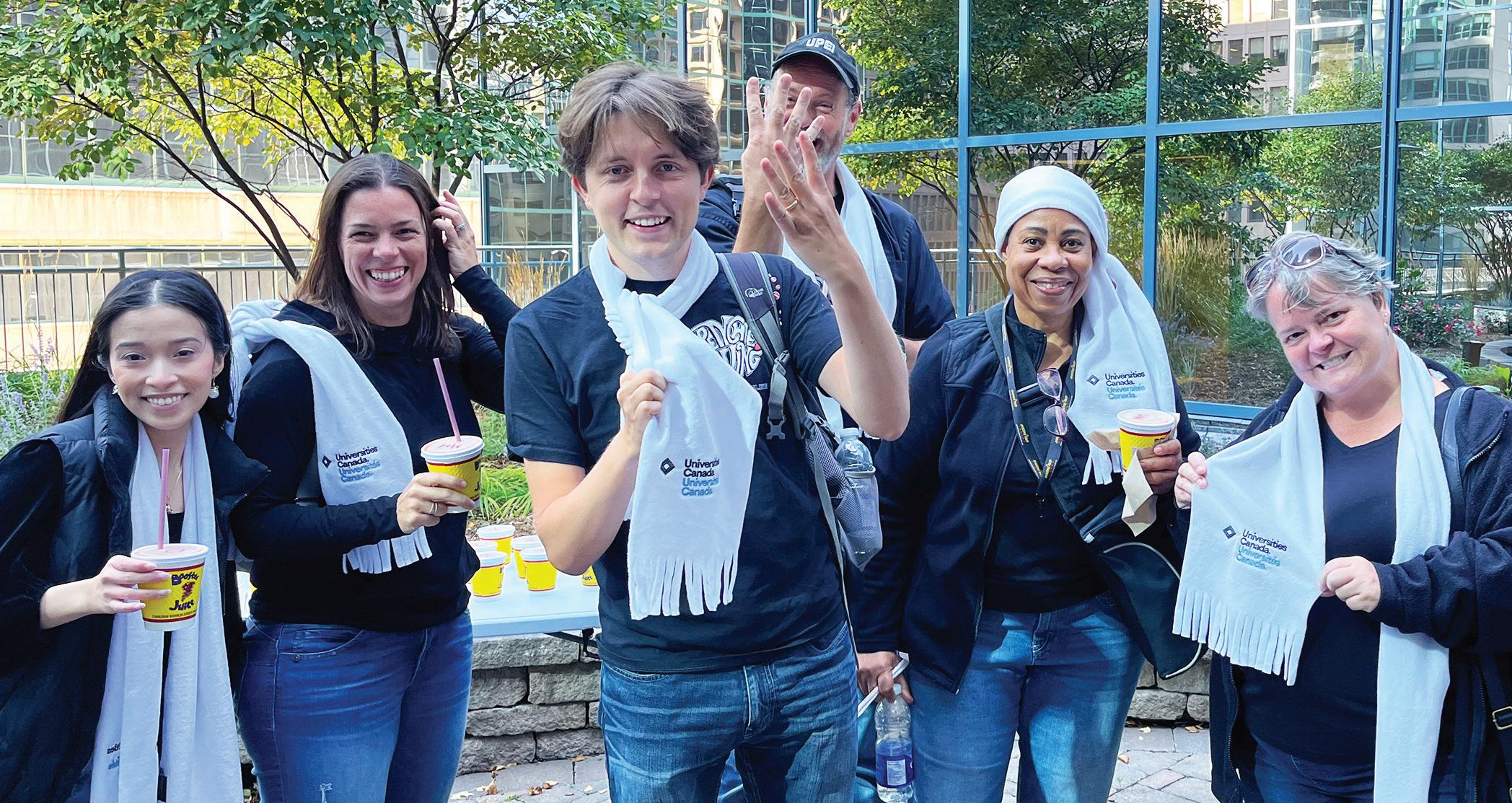
and speaking in French,” says Rodrigues, who is part of an employee-led “FrancoFUN” group which pairs francophone employees with anglophones. “My group likes to talk about reality TV in French over lunch because we share that interest. There’s a lot of laughter.”

47 NATIONAL CAPITAL REGION’S TOP EMPLOYERS 202 3
Universities Canada employees participating in the ‘Amazing Race Canada’ activity.
full-time
in
of managers are women employer-paid health plan, with family coverage weeks, parental top-up pay 90 62% 100% 35
staff
Canada

Tell us your story If you are an exceptional employer with progressive human resources programs and initiatives, consider applying for next year’s edition of National Capital Region’s Top Employers. Now entering its 24th year, our national project is Canada’s longest-running and bestknown editorial competition for employers. For information on next year’s application process, visit: CanadasTop100.com/2024 Applications for our 2024 competition will be released in February and must be returned by April.



















































































































